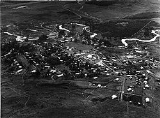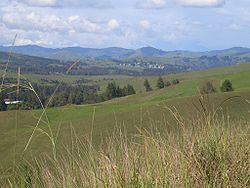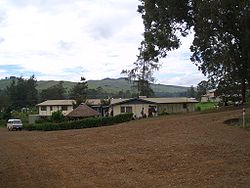
Ukarumpa
Encyclopedia


International community
The international community is a term used in international relations to refer to all peoples, cultures and governments of the world or to a group of them. The term is used to imply the existence of common duties and obligations between them...
that is the main center for Summer Institute of Linguistics (SIL) in Papua New Guinea
Papua New Guinea
Papua New Guinea , officially the Independent State of Papua New Guinea, is a country in Oceania, occupying the eastern half of the island of New Guinea and numerous offshore islands...
, located in the Eastern Highlands Province. It lies approximately 11 kilometres (7 mi) by road from Kainantu
Kainantu
Kainantu is a town in the Eastern Highlands of Papua New Guinea. It had some historical significance as an airstrip town during WWII. It functions primarily as a market town for local produce growers and cash croppers. It is located on the "Highlands Highway" approximately 170 km by road from Lae...
in the Aiyura
Aiyura
Aiyura is the name of a valley located in the Eastern Highlands of Papua New Guinea. It is the home of the Aiyura Agricultural Research Station, which was operated originally as the "Highlands Agricultural Experiment Station, Aiyura" beginning in 1936, Coffee Research Institute, Aiyura National...
Valley. The population consists of a variety of Christian workers, their families and employees. The base was established in the mid-1950s by Wycliffe Bible Translators
Wycliffe Bible Translators
Wycliffe Bible Translators is an interdenominational organization mandated to making a translation of the Bible in every living language in the world, especially for cultures with little existing Christian influence. Wycliffe was founded in 1942 by William Cameron Townsend and is associated with...
. The current population is approximately 1000.
History
The 99-year lease for the 500 acres (2 km²) at Ukarumpa was signed by Dick Pittman, accompanied by founding Director, Dr. James C. ("Jim") Dean for the Summer Institute of Linguistics on 4 October 1956. Jim Dean, his wife Gladys and their four children, Sharon, Timothy, Roseann and David, took up residence at Ukarumpa later that month in a native-materials house called the "Philippine House", so named because it was built on stilts. Their fifth child, Jonathan, was born in the then Australian Trust Territory of New Guinea. Jim Dean was the founding Director of Wycliffe Bible Translators and S.I.L. on the island of New Guinea, and remained as Director until he was reassigned to establish the mission's operations in India in the mid 1960s.The 500 acres (2 km²) had been the Peacock Plantation, a failed commercial venture. Before that, however, it was a plot of land disputed over by surrounding tribes (and traditional enemies), the Gadsup
Gadsup
Gadsup is the name of a tribal group of people living in the Eastern Highlands of Papua New Guinea in or near the Aiyura Valley. They are traditional enemies of the Tairora people.-External links:*...
and Tairora
Tairora
Tairora is the name of a tribal group of people living in the Eastern Highlands of Papua New Guinea in or near the Aiyura Valley. They are the traditional enemy of the Gadsup.-External links:*...
. Because the land was technically vacant in the mid-1950s, the Australian administrators saw it as the ideal place for SIL's base, but this had been the enemy tribes' traditional fighting ground, and tribal skirmishes and clashes continued over the intervening decades.
Originally the land was open kunai (a type of waist-high grass with sharp-edged leaves) with few trees and no development, although it was fertile land for gardens, with the Bae'e river running through it. The missionaries built homes and planted trees which continue to attract bird life. All of the buildings and roads were built by mission volunteers with financial donations from churches and individuals in their home countries.
The function of Ukarumpa is to serve as an operations base for translators, linguist
Linguistics
Linguistics is the scientific study of human language. Linguistics can be broadly broken into three categories or subfields of study: language form, language meaning, and language in context....
s, literacy specialists, teachers and other professionals who are mainly volunteer workers with SIL. SIL International
SIL International
SIL International is a U.S.-based, worldwide, Christian non-profit organization, whose main purpose is to study, develop and document languages, especially those that are lesser-known, in order to expand linguistic knowledge, promote literacy, translate the Christian Bible into local languages,...
is a sister organization to Wycliffe Bible Translators
Wycliffe Bible Translators
Wycliffe Bible Translators is an interdenominational organization mandated to making a translation of the Bible in every living language in the world, especially for cultures with little existing Christian influence. Wycliffe was founded in 1942 by William Cameron Townsend and is associated with...
, and is a world-class scientific organization with a strong emphasis on linguistic research and literacy, as well as translation.
Geography
Ukarumpa is located on the Bae'e RiverBae'e River
The Bae'e River is a river of Papua New Guinea, located in Eastern Highlands Province, in Ayura Valley....
. The Bae'e originates upstream from Ukarumpa and runs past the Gadsup
Gadsup
Gadsup is the name of a tribal group of people living in the Eastern Highlands of Papua New Guinea in or near the Aiyura Valley. They are traditional enemies of the Tairora people.-External links:*...
village on to Kainantu
Kainantu
Kainantu is a town in the Eastern Highlands of Papua New Guinea. It had some historical significance as an airstrip town during WWII. It functions primarily as a market town for local produce growers and cash croppers. It is located on the "Highlands Highway" approximately 170 km by road from Lae...
. It lies at an altitude of approximately 1500 metres (4,921.3 ft). The climate is Equatorial Highland; there are cool days and nights, with daily afternoon rains between November and March.
The flora are primarily evergreen trees (Pine
Pine
Pines are trees in the genus Pinus ,in the family Pinaceae. They make up the monotypic subfamily Pinoideae. There are about 115 species of pine, although different authorities accept between 105 and 125 species.-Etymology:...
, Eucalyptus
Eucalyptus
Eucalyptus is a diverse genus of flowering trees in the myrtle family, Myrtaceae. Members of the genus dominate the tree flora of Australia...
, Casuarina
Casuarina
Casuarina is a genus of 17 species in the family Casuarinaceae, native to Australasia, southeast Asia, and islands of the western Pacific Ocean. It was once treated as the sole genus in the family, but has been split into three genera .They are evergreen shrubs and trees growing to 35 m tall...
); there are also coffee
Coffee
Coffee is a brewed beverage with a dark,init brooo acidic flavor prepared from the roasted seeds of the coffee plant, colloquially called coffee beans. The beans are found in coffee cherries, which grow on trees cultivated in over 70 countries, primarily in equatorial Latin America, Southeast Asia,...
plantations nearby, and kunai grass-covered hills.
See also
- Ukarumpa International SchoolUkarumpa International SchoolUkarumpa International School is an accredited PreK-12 school in Ukarumpa, Papua New Guinea.-Accreditations and Recognitions:*Sponsored by the Summer Institute of Linguistics*Accredited by the Western Association of Schools and Colleges, USA....
- http://www.ukarumpainternationalschool.org
- http://www.pnglanguages.org/pacific/png | SIL-PNG Website on PNG languages
- LinguisticsLinguisticsLinguistics is the scientific study of human language. Linguistics can be broadly broken into three categories or subfields of study: language form, language meaning, and language in context....

